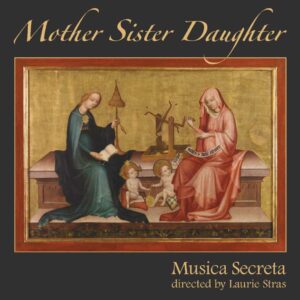Mother, Sister, Daughter: Musica Secreta Sings the Stories of Women (CD Review)
Mother, Sister, Daughter
Musica Secreta, directed by Laurie Stras
Lucky Music
Over a career that spans thirty years, Musica Secreta has established themselves as one of the premiere all-female vocal ensembles. They have recorded a number of pieces by women, expanding the repertoire of Renaissance music and our understanding of the social, liturgical, and artistic circles in which it was disseminated. The theme of this recording is “storytelling:” how stories, poems, and music were crafted to connect generations of women, hence Mother, Sister, Daughter as its title. While many of the pieces are anonymous, the circumstances in which they were copied and performed give clues as to their provenance. The recording isn’t strictly of works attributed to women – there are pieces by Antoine Brumel and Jean Mouton – but these also extol the relationships between women, particularly those who have entered a convent.
Missa de Beata Virgine is a partial setting of the Ordinary, containing a Kyrie and troped Gloria with extra texts that extol the Virgin Mary. Here as elsewhere, instruments are used to accompany and to flesh out the texture; organ in particular, but also harp (including bray harp and double harp), and treble and bass viols. This is consistent with the practice of music-making in convents. Musica Secreta has a well-blended sound with just enough brightness in the sopranos and a warm timbre in the mezzo/alto cohort. The solo chants are prepared with the character of the individual voices in mind. One of the main selections, The Vespers of St. Lucy was likely composed in a convent devoted to St. Lucia in Verona. The notes, by ensemble director Laurie Stras, are fastidiously annotated: I would recommend reading them before diving in to listening. The Vespers include five brief movements that tell the story of St. Lucy. The full group’s singing is fetchingly contrasted with smaller subsections.
Ave mater matris Dei, attributed to Jean Mouton, consists of vocal canons accompanied by the organ, the refrains opening up to sumptuous tutti. Virgo Maria speciosissima, attributed to Leonora d’Este, of that most famous of families, consists of overlapping waves in the voices performed with artful coordination by Musica Secreta. It is one of the standouts on the recording.
The other prominent collections on the recording are two sets of Vespers from San Matteo in Florence, dedicated to Saint Clare. After a plainchant opening is the beautiful Mundi totius gloriam, with high-lying dovetailing lines alternating once again with chant. The group chants are paced with a welcome sense of forward momentum. The hymn En praeclara virgo Clara and a Salve sponsa Dei setting conclude the second set of Vespers with radiant polyphonic singing.
A contemporary piece, commissioned by the ensemble from Joanna Marsh, completes the CD program (two additional pieces are available on the digital recording). The Veiled Sisters explores the entire compass of the group, beginning with a low-lying melody in the altos that is succeeded by upper register divisi. The two then meld into a formidable tutti. Marsh deftly incorporates contemporary harmonies and expanded ranges while using the resources of Musica Secreta is a way consistent with their approach on the rest of the recording; organ accompanies them and the alternation of textures creates a connection between old and new.
In recent years, research and performance of women’s music from the Renaissance has come a long way, in no small part to Musica Secreta and Laurie Stras. It is heartening to learn that, even five hundred years ago, the stories women told to one another provided strength, agency, and, in the case of song, great beauty.
-Christian Carey
